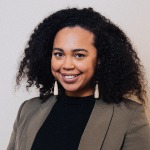.jpg?sfvrsn=dcaa7b8c_0)
Among all the diversity, equity, and inclusion (DEI) trainings, articles, committees, public statements, and policy focus in the last two years since George Floyd’s murder, one resource has been absent in the legal workplace: a regular space for only Black, Indigenous, and People of Color (BIPOC) to connect and support one another, without any ‘asks.’
In spring 2021, the Derek Chauvin trial was about to begin. Anxiety, trauma, and grief consumed much of the Black and BIPOC community, and those who were also legal professionals experienced exacerbated emotions. Many found it emotionally draining just to show up at work, while others grappled with, and questioned their place in the law at all, fearing that without justice for George Floyd, it would be daunting to continue in the field. I knew the MSBA, HCBA, and RCBA had both an opportunity and obligation to provide resources to the BIPOC community that had never been offered before.
In partnership with Twin Cities Diversity in Practice (TCDIP) and Lawyers Concerned for Lawyers (LCL), the bar associations offered listening sessions for BIPOC legal professionals. These sessions allowed space for these community members to share their narratives, truths, grief, frustration, and anything else weighing on them at that moment. The sessions are the first of their kind in the Minnesota legal community. They are an opportunity for those who are often siloed in their workplace to connect with others who look like them, have similar stories, and just ‘get’ what they were experiencing without feeling tokenized, judged, or having their experiences whitewashed and used only to benefit a diversity check box.
The response from the BIPOC legal community was both uplifting and frankly, startling. While the many stories and experiences of rampant racism (often daily) in forms of policy, microaggressions, and hiring/retention in firms and organizations affirmed the anti-racist and equity work needed in all aspects of the legal field, the connections and community built from these sessions provided emotional relief and affirmation to many people who rarely experience it—especially at work. As these groups have grown, we've rebranded them as connection groups where BIPOC legal professionals can continue to connect, provide support, and share what's on their minds in a safe environment.
Fast forward to the killing of Amir Locke in February of this year. A statement was sent out on behalf of HCBA, RCBA, and MSBA leadership acknowledging the significance of another Black man dying at the hands of law enforcement. More importantly, the leadership committed to actionable steps to serve Black and BIPOC legal professionals facing another crisis. With support from various leaders at the Bar Associations, a permanent, monthly support/listening group was established that I facilitated. This remains a space to continue listening, uplifting, and providing much-needed connection and relief to our BIPOC community.
This monthly support group had its first meeting in March and continues to meet monthly, involving BIPOC legal professionals of various ages, organizations, and career stages. A similar message from every individual that shows up is exactly the same: It is exhausting being a person of color in law. Testimony from attendees includes an increased connection (especially between racial groups), emotional relief, authenticity, confidence, and peace. The devastating reality is, however, that this may be the only place attendees feel seen and heard in the field consistently.
Testimony from attendees includes an increased connection (especially between racial groups), emotional relief, authenticity, confidence, and peace.
I consistently get asked by white supervisors and leaders, “What can I do to make an immediate impact on my BIPOC staff?” From leading listening sessions and the monthly BIPOC connection group, here is my number one message and ask: check in on your BIPOC staff (and keep checking in).
Taking a minute to personally check in with BIPOC staff makes a significant difference in how they may view the culture of an organization. Affirmation and empathy in the challenges they are facing due to their identity make a difference, and following up with tangible resources is significant to staff retention and a feeling of belonging. It is okay—especially if you are white—to say, “I don’t know exactly what you are going through, but I see you, appreciate you, and here is what I can offer to try and reduce the burden.”
Unfortunately, like many experienced after George Floyd’s murder, the burden of DEI advancement often gets placed on the BIPOC community, also known as the Diversity Tax. Instead of assuming what your BIPOC staff does or doesn’t need, ask. Be courageous in asking uncomfortable questions, addressing your privilege, and taking transparent accountability when you’ve fallen short. Finally, I leave you with a reminder that while these types of support groups are equitable ways to help ease the burden of what it means to carry black or brown skin, for many it is a very temporary relief.
What is your organization doing to remove the weight?
If you are a BIPOC attorney, judge, law student, or legal professional interested in joining our group, please email me at eryan@mnbars.org
 Erikka Ryan
Erikka Ryan
eryan@mnbars.org
Erikka is the director of equity, inclusion, and foundations for the HCBA, MSBA, and RCBA.